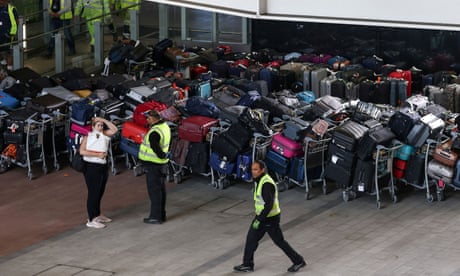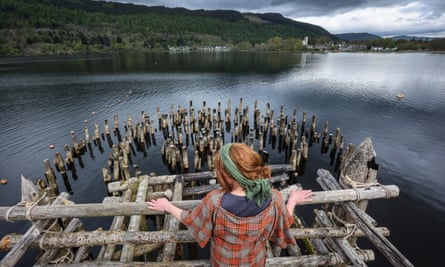Even in forward-thinking Reykjavik, finding a preschool place for the youngest infants is tough. Parents explain why
Sarah Marsh in Reykjavik
The Guardian
@sloumarsh
@sloumarsh
Thu 18 May 2023
In a bright, bunting-filled community hall in central Reykjavik, Eggert Arason bounces his 17-month-old son, Mosi, on his lap as they sing the Icelandic version of Row Your Boat, accompanied by an acoustic guitar. It’s mid-morning on a Thursday, and Arason is not the only dad who is off work to attend the council-funded playgroup. Half the room of 30 people are fathers – not unusual in a country considered to have one of the best childcare policies in the world.
As well as six months’ leave for both parents at 80% of pay – with six weeks extra to share between them – childcare is heavily subsidised by the government. Yet parents and policymakers are pushing for more.
Iceland spends 1.7% of its gross domestic product on early-childhood education and care – more than double that of most other countries. That leaves Icelandic families spending only around 5% of their income on childcare. An average full-time, eight-hour-a-day preschool place, including meals, costs about £200 a month. In 2020, 96% of Icelandic children between the ages of three and five were enrolled in early childhood education programmes, compared with 83% on average across OECD countries.
In a bright, bunting-filled community hall in central Reykjavik, Eggert Arason bounces his 17-month-old son, Mosi, on his lap as they sing the Icelandic version of Row Your Boat, accompanied by an acoustic guitar. It’s mid-morning on a Thursday, and Arason is not the only dad who is off work to attend the council-funded playgroup. Half the room of 30 people are fathers – not unusual in a country considered to have one of the best childcare policies in the world.
As well as six months’ leave for both parents at 80% of pay – with six weeks extra to share between them – childcare is heavily subsidised by the government. Yet parents and policymakers are pushing for more.
Iceland spends 1.7% of its gross domestic product on early-childhood education and care – more than double that of most other countries. That leaves Icelandic families spending only around 5% of their income on childcare. An average full-time, eight-hour-a-day preschool place, including meals, costs about £200 a month. In 2020, 96% of Icelandic children between the ages of three and five were enrolled in early childhood education programmes, compared with 83% on average across OECD countries.
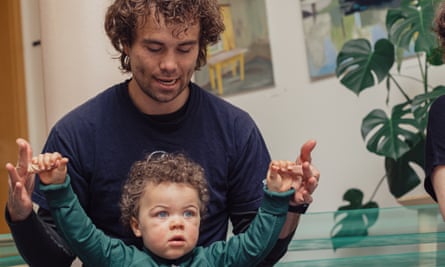
Eggert Arason, 29, and his son Mosi.
Photograph: Jon Clements
Despite this, parents at the Thursday playgroup, run by an organisation called Memmm, are pushing for more change. Arason, 29, is a student, but took the first six months of Mosi’s life off to spend time as a family. Since then, the family has struggled to find a preschool place. They applied to 10 providers before finding somewhere. It’s a familiar picture to families across the country.
A growing issue has been a lack of childcare for children between 12 months and two. Both “day-mothers” (childminders) and preschools are in short supply. Covid led to a rise in births, and Iceland saw 16.5% more births than normal in the second quarter of 2021, making that year the fourth highest for number of births in Icelandic history. It comes amid staffing issues as preschools struggle to keep staff because pay does not always match demand.
Also at the Memmm playgroup is Ragnhildur Thorlacius, 44, and she too has struggled to get a preschool place. She is working part-time until her 16-month-old daughter, Svala, starts preschool. “We have got a place now, but it’s quite far away so we have to rent a car to get there,” she says.
Despite this, parents at the Thursday playgroup, run by an organisation called Memmm, are pushing for more change. Arason, 29, is a student, but took the first six months of Mosi’s life off to spend time as a family. Since then, the family has struggled to find a preschool place. They applied to 10 providers before finding somewhere. It’s a familiar picture to families across the country.
A growing issue has been a lack of childcare for children between 12 months and two. Both “day-mothers” (childminders) and preschools are in short supply. Covid led to a rise in births, and Iceland saw 16.5% more births than normal in the second quarter of 2021, making that year the fourth highest for number of births in Icelandic history. It comes amid staffing issues as preschools struggle to keep staff because pay does not always match demand.
Also at the Memmm playgroup is Ragnhildur Thorlacius, 44, and she too has struggled to get a preschool place. She is working part-time until her 16-month-old daughter, Svala, starts preschool. “We have got a place now, but it’s quite far away so we have to rent a car to get there,” she says.
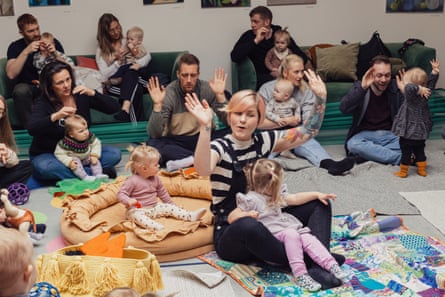
María Ösp, one of the organisers of the Memmm playgroup,
singing with her daughter on her lap.
Photograph: Jon Clements
The issue prompted a group of parents to protest at Reykjavik city council hall in March. The Reykjavik area accounts for some 60% of Iceland’s 372,000 population. For the past 15 years, around 1,000 children throughout Iceland have been without preschools or daycare every year.
Parents in Iceland tend to have flexible employers, who keep their jobs open if they need time to find a preschool. However, this is unpaid and some new parents lean on family or other support rather than missing work.
In her city hall office, the Reykjavik city council member Sabine Leskopf, who is on the preschools committee, says: “We are aiming for a 0% gender pay gap. What the equal leave policy means is that, if an employer has a male and female applicant, both equally qualified, then a decision about who to hire won’t be made based on gender. The employer does not think, ‘Oh, I will not pick the woman as she may be on maternity leave soon.’”
The main problem is a “lagging” behind in repairing old school buildings, says Leskopf. After the financial crisis in 2008, these buildings were not preserved and no new buildings were built.
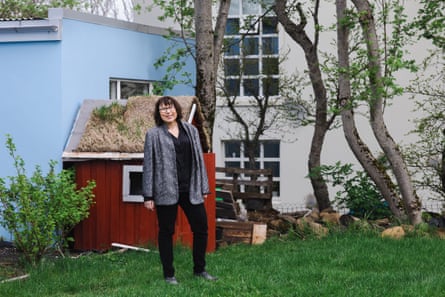
The issue prompted a group of parents to protest at Reykjavik city council hall in March. The Reykjavik area accounts for some 60% of Iceland’s 372,000 population. For the past 15 years, around 1,000 children throughout Iceland have been without preschools or daycare every year.
Parents in Iceland tend to have flexible employers, who keep their jobs open if they need time to find a preschool. However, this is unpaid and some new parents lean on family or other support rather than missing work.
In her city hall office, the Reykjavik city council member Sabine Leskopf, who is on the preschools committee, says: “We are aiming for a 0% gender pay gap. What the equal leave policy means is that, if an employer has a male and female applicant, both equally qualified, then a decision about who to hire won’t be made based on gender. The employer does not think, ‘Oh, I will not pick the woman as she may be on maternity leave soon.’”
The main problem is a “lagging” behind in repairing old school buildings, says Leskopf. After the financial crisis in 2008, these buildings were not preserved and no new buildings were built.

Sabine Leskopf, a member of the Reykjavik city council, says there is a shortage of qualified early-years teachers.
Photograph: Sigga Ella/The Guardian
There is also a shortage of qualified early-years teachers. “You train at university for five years to become a preschool teacher, and that is a long time for the comparatively low wages you get,” Leskopf says.
I saw a massive change in how I was feeling and developing as a father, but I also saw a change in my wifeBjörn Baldursson, on his six months of patenrity leave
This is despite the fact that the average pre-primary teacher’s salary among those between 25 and 64 is one of the highest (per hour of net teaching time) among OECD and partner countries.
Some are now calling for total leave for parents to be extended from 12 to 18 months so that they can cope with the lack of preschool places. Some also want the cap of 600,000 Icelandic kronur (£3,500) a month before taxes on the amount people can receive while on leave to be increased as the cost of living rises.
In a Reykjavik cafe, with her nine-month-old daughter and partner in tow, Freyja Steingrímsdóttir says the government need to create more places or extend leave. She works for BSRB, a federation of public worker unions in Iceland, so has a particular understanding of the current issues in childcare provision.
There is also a shortage of qualified early-years teachers. “You train at university for five years to become a preschool teacher, and that is a long time for the comparatively low wages you get,” Leskopf says.
I saw a massive change in how I was feeling and developing as a father, but I also saw a change in my wifeBjörn Baldursson, on his six months of patenrity leave
This is despite the fact that the average pre-primary teacher’s salary among those between 25 and 64 is one of the highest (per hour of net teaching time) among OECD and partner countries.
Some are now calling for total leave for parents to be extended from 12 to 18 months so that they can cope with the lack of preschool places. Some also want the cap of 600,000 Icelandic kronur (£3,500) a month before taxes on the amount people can receive while on leave to be increased as the cost of living rises.
In a Reykjavik cafe, with her nine-month-old daughter and partner in tow, Freyja Steingrímsdóttir says the government need to create more places or extend leave. She works for BSRB, a federation of public worker unions in Iceland, so has a particular understanding of the current issues in childcare provision.
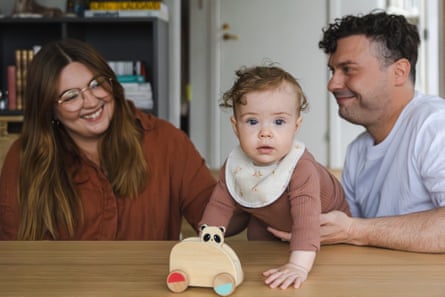
Freyja Steingrímsdóttir and her family.
Photograph: Sigga Ella/The Guardian
“What needs to happen is legislature that guarantees a child a place from the age of one – just as every six-year-old gets a place in elementary school. That would then require the state to give enough funding to the municipalities to be able to offer the right number of places.”
“Probably the next step will be the parental leave payments – it’s only 80%, and the cap hasn’t been changed in years.”
It has only been two years since Iceland made major changes around paternity leave. In 2021, the period men could take went from four to six months. The move has largely been assessed as a success. Academics from the University of Iceland, Ásdís Arnalds and Guðný Eydal, say studies show parents are dividing the care of their children more equally. Surveys show a downward trend of mothers taking most of the responsibility. About 80% of men take paternity leave.
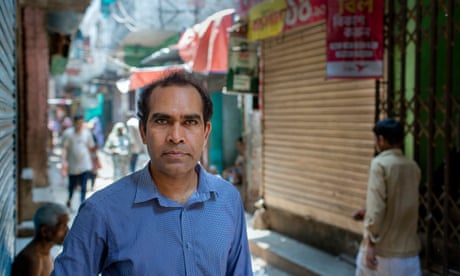
‘We have a right to live in dignity’: Biharis in Bangladesh fight for equality – and jobs
“What needs to happen is legislature that guarantees a child a place from the age of one – just as every six-year-old gets a place in elementary school. That would then require the state to give enough funding to the municipalities to be able to offer the right number of places.”
“Probably the next step will be the parental leave payments – it’s only 80%, and the cap hasn’t been changed in years.”
It has only been two years since Iceland made major changes around paternity leave. In 2021, the period men could take went from four to six months. The move has largely been assessed as a success. Academics from the University of Iceland, Ásdís Arnalds and Guðný Eydal, say studies show parents are dividing the care of their children more equally. Surveys show a downward trend of mothers taking most of the responsibility. About 80% of men take paternity leave.

‘We have a right to live in dignity’: Biharis in Bangladesh fight for equality – and jobs
According to a recent academic paper, parents who had a child immediately after the fathers’ quota was introduced were considerably less likely to divorce than parents who had a child just before the law was implemented.
Men have spoken of the huge benefits of spending more time with their children. Björn Baldursson says he believes it helped his wife, who experienced postnatal depression with their first child. The 30-year-old air-traffic controller took little time off when his son was born but took six months with his daughter. “I saw a massive change in how I was feeling and developing as a father, but I also saw a change in my wife. I have been looking into it, and it lowers risk of postpartum depression if your partner is active.”
Dagný Pind, a legal adviser at the BSRB, says the next step is “to ensure that all children have access to good, affordable childcare after 12 months”.
In a negotiating round in May, the BSRB asked to reduce working hours for preschool staff each week, “and we managed that”. Pind adds: “The other [campaign] was to tackle the problem of pay inequality through re-evaluating work in female-dominated occupations. That work is ongoing.”
When asked whether they have the best childcare system in the world – often the perception of outsiders – many Icelandic parents say they are unsure. Perhaps it is a marker of how far they have come that they aren’t willing to accept anything less.

